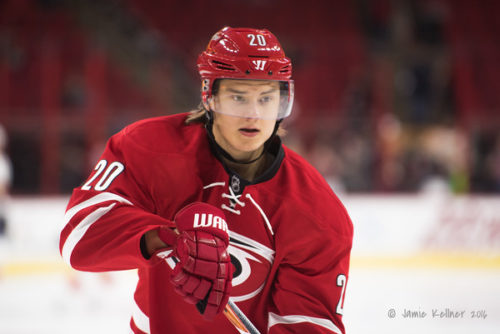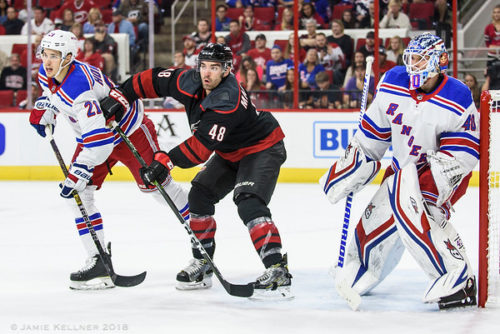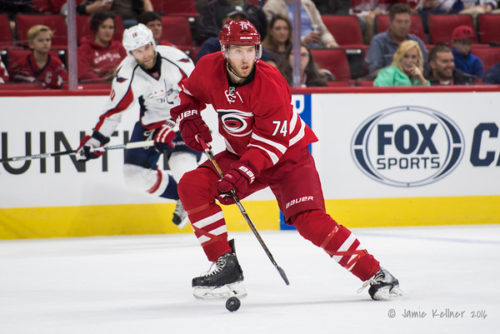Yesterday’s Daily Cup of Joe considered the next leg up for Sebastian Aho and Lucas Wallmark.
Today’s Daily Cup of Joe continues in the same vein and looks at Andrei Svechnikov.
Last off-season, the Carolina Hurricanes received an early gift when the team vaulted up the draft lottery and into #2 slot in the 2018 NHL Draft where the Canes would nab the consensus top forward Andrei Svechnikov. Svechnikov came heralded as NHL-read, compared to power forwards like Marian Hossa and with expectations that he would compete for the Calder Trophy.
Svechnikov’s rookie season was a mixed bag in that he did not hit the ice sprinting at the NHL level, but he did do enough to keep every bit of his projected upside intact for the future.
The positives
On a positive note, Svechnikov looked NHL-ready physically. He will certainly add a few pounds and some strength in the coming years, but he did not look overmatched physically of with the pace of the NHL game. And though his game did have its gaps, he intermittently flashed a well-rounded offensive tool set that included labeled snipes, good hands in close and a power forward element charging to the net. His 20 goals are a very respectable total for a rookie season.
While I would consider his 37 points to be middle of the roster depth scoring, I think the skill set that he flashed on occasion does clearly project to 30 goals and 60 points or more if he can continue to develop and refine his game.
The realistic assessment
While first noting that the immense upside that Svechnikov had when drafted is still very much intact, his 2018-19 season leaned learning or dominating.
As might be expected for an offensive-minded 18-year old, Svechnikov was below average defensively and compounded that by far too often playing defense with his stick instead of his mind and his feet which landed him in the penalty box far too regularly especially during the first two-thirds of the season.
And while his 20 goals were a solid rookie season total, Svechnikov’s offensive play had pluses and minuses too. Despite a healthy helping of 157 minutes of power play ice time, he tallied exactly zero power play goals and only five assists. His 20 goals are a solid stake in the sand for a rookie season, but his 37 points are really just average-ish depth scoring on a good NHL roster. And his efforts to beat NHL goalies are still a work in progress. In alone, his general approach of going backhand to forehand or vice versa late might have been enough for junior level goalies but is not yet quick enough to create and shoot into an opening against NHL netminders.
Current status and next level(s)
The current version: When one nets it out, the 2018-19 version of Andrei Svechnikov was a decent not great depth scoring option who was a bit of a liability defensively and not really a contributor on special teams. As such, I think he gets credit for being a serviceable middle six forward with both limitations and upside.
The next level: As a 19-year old coming out of his first professional season Svechnikov likely has multiple next levels that could be reached at once or gradually. He made strides with minimal relapses in terms of his stick infractions down the stretch of the 2018-19 season. I think the key here is just maturing in terms of every second intensity and focus. The majority of his defensive struggles came not so much from poor judgement initially but rather from mentally floating for just a few seconds and then sort of waking up out of position relative to the play. Offensively, his ability to beat NHL goalies is still a work in progress which is a positive given that he did score 20 goals. He spent a good number of shots in 2018-19 learning how small the opening/opportunity is at the NHL level. He does have the release and skill to score obviously, so this is just a matter of continuing to mature and refine his game offensively.
Specifically for the 2019-20 season, I see two possible next levels. The first builds step-wise on his 2018-19 season and sees him mature defensively while also making modest gains offensively. The result is a better all-around player in the 50-55 point range. The second level would be if things suddenly click and he takes the big leap that is possible for players of his skill level. As far as projecting into the future, as a finishing power forward Svechnikov projects more than any other player currently in the organization to be a first-line finisher to play with Aho with goals north of 30 and total points up near Aho.
What say you Canes fans?
1) Projections and future aside, how would you assess Andrei Svechnikov’s 2018-19 season based on merit and results alone?
2) What do you project for Svechnikov’s development path from here? What is his ultimate upside? And maybe equally importantly, how much of that do you think will be reached in 2019-20?
Go Canes!




1) Merit can be objective or subjective. Svechnikov’s numbers were decent but not nearly as impressive as some other recent 2OAs like Eichel and Landeskog. But Svechnikov did show flashes of brilliance that made me think he may end up with numbers similar to a Landeskog or at the very least Sam Reinhart. So the numbers were disappointing but the appearance was encouraging.
2) Though I mentioned other #2 picks, my expectations are that Svechnikov follows a progression closer to Draisaitl–another Eruopean player who came over for juniors in the CHL. Draisaitl underwhelmed as a 19-year-old (2 goals and 7 assists in 37 games). He became McDavid’s linemate and exploded. I think if/when Svechnikov plays on Aho’s line he will be a regular 30-35 goal scorer. For 19-20 I expect 25 goals and 50 points at a minimum.
Svechnikov is only going to get quicker, smarter and stronger. I agree with ct, 25 goals, 50 points or higher. There is always the possibility of the sophomore slump.
I do not know if Eichel or Landeskog were 19 when they started in the NHL? Eichel may have been. Early in the season he was learning and too many stick infractions. He is still part of the reason I am excited moving forward. So many young guys who will only get better.
It would have been great to see 50+ points in his first season but the upside is so high. You can always want more but I was thinking he still had a pretty good first year.
If you think of him as an 18-year-old rookie and not as a #2 pick, 37-points and 20 5×5 goals was a very nice season. He definitely struggled with defense in the first half – playing the puck before he got out of the penalty box and getting a second minor may have been the low point – but noticeably improved as the season wore on. He is already tough to play against but (agreeing with ice) is going to get much stronger and quicker and smarter.
Always tough to project a ceiling, but there is clearly way more for him to give – his production could easily double from here over the next 2-3 years. We have built-in improvement in our core players and Svetch is a big part of that. Very excited to see what steps he takes over the summer.
I thought his growth from first part of season to last part of season was incredible. Honestly, his goal total is even inflated a little bit because he had several empty net goals. But I thought he was playing a complete game by the end of the year AND was really finding his offense as well.
Totally agree with your assessment, and maybe it was a little disappointing this year with the expectation that comes with the top forward taken in the draft, but the trajectory is really exciting.
Svechnikov had a very nice season for any 18 year old. One can expect he will improve, but how Svechnikov needs to improve is different than most youngsters. Svechnikov has an adult body. Full grown man as they say. He can’t count on significant increases in size and strength. His improvement needs to come between the ears. He needs to be better defensively, as noted, but he also needs to be smarter offensively reading the game. He has a very nice shot and learning where the soft spots are will allow him to take advantage of his abilities. By all indications Svechnikov is a hard worker, so hopefully this will come. I don’t expect an explosion in production from the kid, but steady improvement over the next several years.
I see a lot of similarities with Teuvo, but a higher upside as a goal scorer. 30 goals and 60 points should be a typical season but I wouldn’t be surprised if in a couple to three years he flirts with 40 goals. He’s got everything going for him but an easily spelled nickname.
With all of the analysis in the article and comments there isn’t much left to add. But there is space to build on CT’s comments on Draisaitl.
Comparing Svechnikov’s production (20 – 17 – 37) to his frequent line mates Wallmark (10 – 18 – 28) and Martinook (15 – 10 – 25), Andre was about 10 points ahead of his line mates. That projects well as he rounds out his game and is paired with more prolific scorers.
His skill set wasn’t a good fit in the Hurricanes power play system this year, but as he – and the power play – evolves that will change too.
For those reasons he will likely project to the higher end of the ranges presented here.